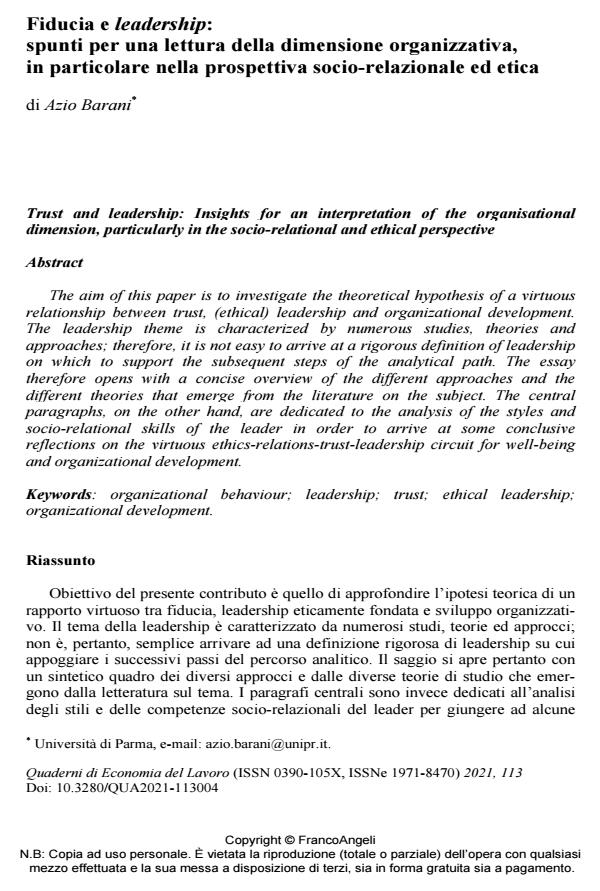Trust and leadership: Insights for an interpretation of the organisational dimension, particularly in the socio-relational and ethical perspective
Journal title QUADERNI DI ECONOMIA DEL LAVORO
Author/s Azio Barani
Publishing Year 2022 Issue 2021/113
Language Italian Pages 36 P. 47-82 File size 400 KB
DOI 10.3280/QUA2021-113004
DOI is like a bar code for intellectual property: to have more infomation
click here
Below, you can see the article first page
If you want to buy this article in PDF format, you can do it, following the instructions to buy download credits

FrancoAngeli is member of Publishers International Linking Association, Inc (PILA), a not-for-profit association which run the CrossRef service enabling links to and from online scholarly content.
The aim of this paper is to investigate the theoretical hypothesis of a virtuous relationship between trust, (ethical) leadership and organizational development. The leadership theme is characterized by numerous studies, theories and approaches; therefore, it is not easy to arrive at a rigorous definition of leadership on which to support the subsequent steps of the analytical path. The essay therefore opens with a concise overview of the different approaches and the different theories that emerge from the literature on the subject. The central paragraphs, on the other hand, are dedicated to the analysis of the styles and socio-relational skills of the leader in order to arrive at some conclusive reflections on the virtuous ethics-relations-trust-leadership circuit for well-being and organizational development.
Keywords: organizational behaviour; leadership; trust; ethical leadership; organizational development.
- Una rilettura etico-sociale del lavoro come (nuovo) principio di «sus-solidarietà» fondato sulla persona, per favorire prestazioni istituzionali partecipative e democratiche, orientate allo sviluppo e al ben-essere integrale e sostenibile Azio Barani, in QUADERNI DI ECONOMIA DEL LAVORO 115/2025 pp.9
DOI: 10.3280/QUA2022-115002
Azio Barani, Fiducia e leadership: spunti per una lettura della dimensione organizzativa, in particolare nella prospettiva socio-relazionale ed etica in "QUADERNI DI ECONOMIA DEL LAVORO" 113/2021, pp 47-82, DOI: 10.3280/QUA2021-113004